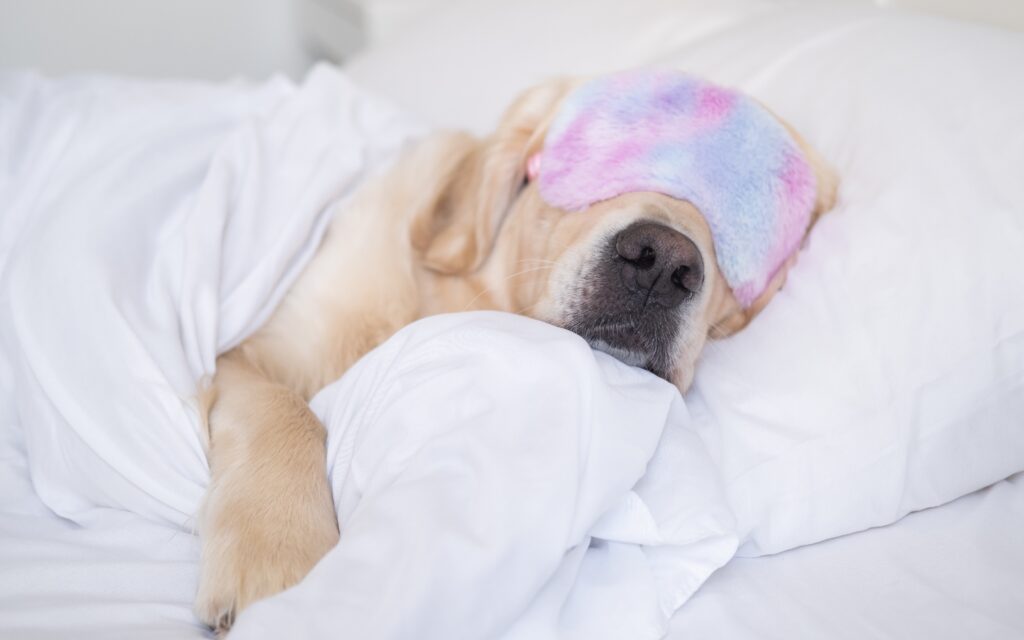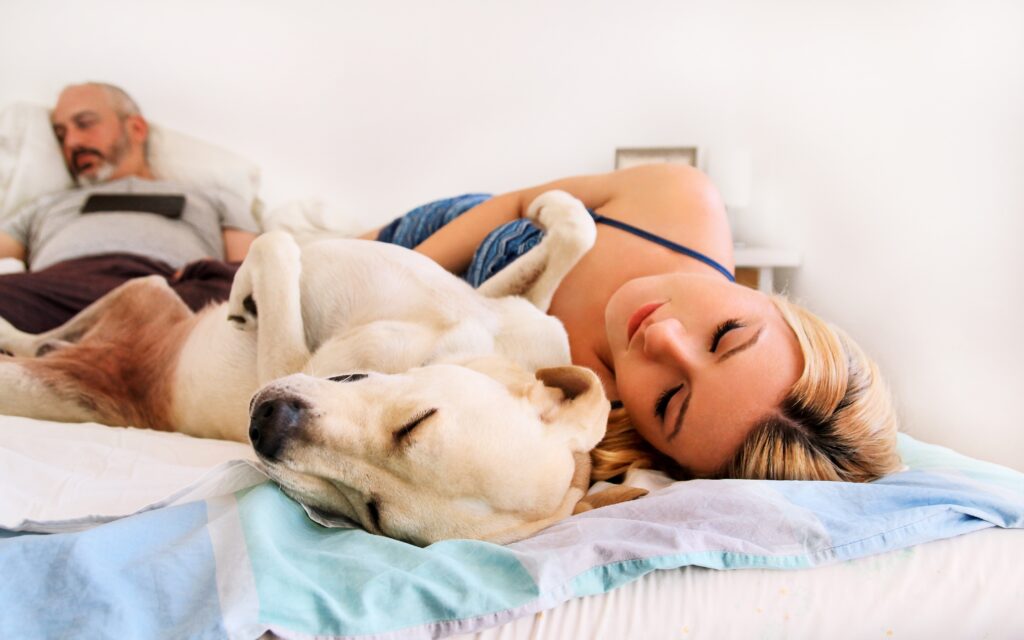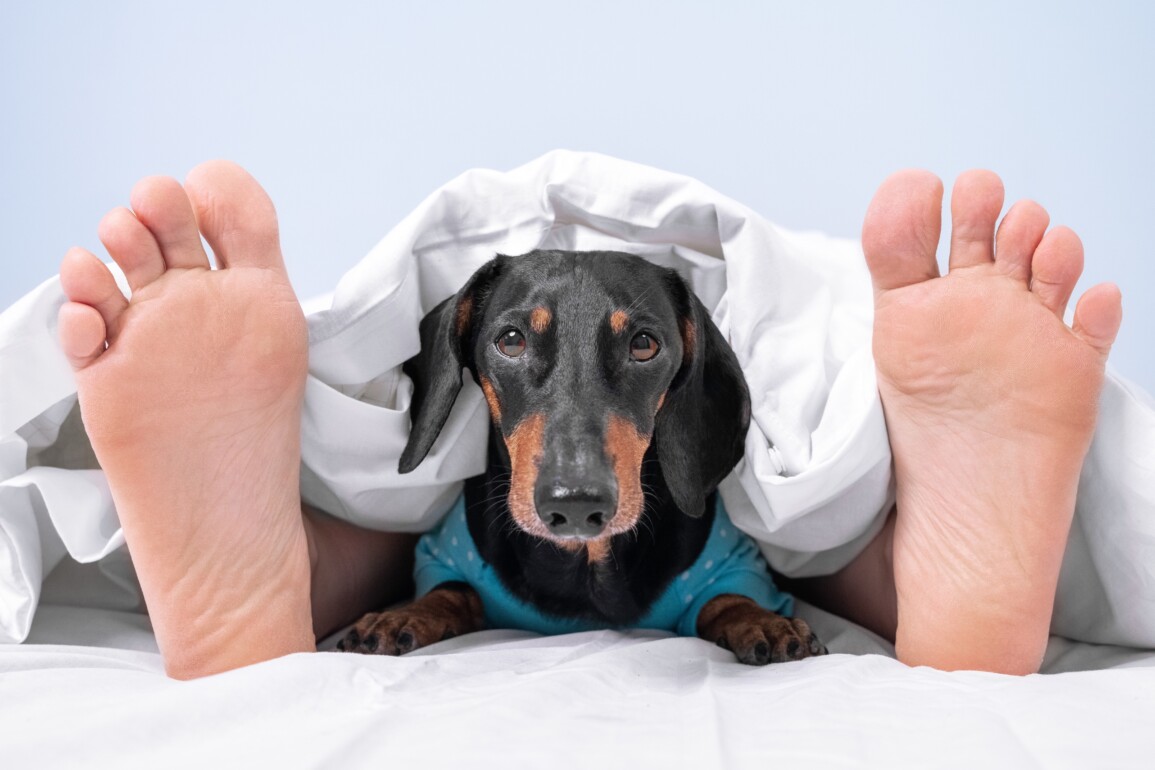Should dogs sleep in your bed at night?
This is a controversial topic among pet parents. Some pooch lovers believe they get the best possible night’s sleep, when they have their furry friend snoring beside them. Others think it’s important to set boundaries around the bedroom.
Currently, research suggests around half of all pet owners share a bedroom, or bed with their pet. It’s up to you to determine whether Fido’s morning breath is going to contribute to your insomnia, or whether it could be more comforting than the best memory foam pillow.
Let’s take a closer look at the pros and cons of allowing your dog in bed with you.
Sleeping with your dog: The benefits of having a dog in bed
The good news for people who love spending evenings snuggled up with their pooch, is sleeping with your dog could actually be good for you.
One study from Human Nature notes sleeping with pets has been a common practice for human beings for centuries. Many Aboriginal Australians used to sleep beside their dogs for warmth and protection.
Today, a snoozing pooch could still do great things for your sleeping habits, by reducing anxiety, and improving your mood – putting you in a better place to fall asleep.
Research demonstrates animal-assisted activities can reduce depressive and stress-based symptoms in human beings. A dog in bed increases the flow of oxytocin, and potentially inspires sweeter dreams.
The question, ”should dogs sleep in your bed?”, can maybe be answered with positive study results. Having a dog sleeping in the bedroom with you creates the following beneficial effects:
Promotes better dreams:
Some researchers believe sleeping with a dog in bed can significantly improve theta brainwaves, responsible for REM sleep.
A dog’s instinct is to protect its human, so we naturally feel safer around our dogs. A report found the presence of a pet in bed helped women feel more secure and comfortable when falling asleep.
Studies also indicate sleeping next to your dog can reduce nightmares and minimize symptoms of PTSD, and other anxiety disorders.
Improves sleep efficiency:
Sleep efficiency refers to the amount of time you spend sleeping in bed. One set of researchers found people sleeping with dogs had an efficiency rating of around 81%.
This could be a result of your pet reducing feelings of anxiety which would otherwise keep you awake. 74% of pet owners believe their mental health benefits from pet ownership.
Enhances heart health:
Snuggling with your pet promotes the release of oxytocin – the chemical responsible for reducing stress and elevating your mood. It also lowers your heart rate, reduces blood pressure readings, and leads to a healthier heart.
One study from the American Heart Association found pet ownership decreases systemic hypertension in pet owners, despite similar socioeconomic profiles and BMIs.
Reduces allergy risk
One of the biggest complaints people have about sleeping with their pets (besides the excess heat), is it might worsen allergens in the bedroom. However, the reality is having your pet with you in your bedroom could reduce your risk of allergens later in life.
One study found infants sleeping near their pet were less likely to develop allergies later in life. If you’re asking” Should I let my dog sleep with me?” when you have a baby in the bedroom, this might help to sway your decision.

Is it unhealthy to sleep with your dog?
For some people, it’s difficult to see why you shouldn’t let your dog sleep in your bed. If you’re comfortable with the idea of having your pooch sleeping beside you, then giving them access to your bedroom can have more benefits than potential downsides.
Of course, everyone has their own preferences when it comes to sleeping habits. One study found there are a handful of ways sleeping next to your dog could influence the quality of your sleep. For instance, around 20% of people in the study considered their pets to be disruptive.
Your dog could potentially keep you awake with its bad breath, or spend the evening running around on your mattress while you try to snooze.
Here are some instances where you might want to avoid allowing your pet to sleep next to you:
When they’re not house trained
If you’re still toilet training your pooch, and they’re likely to have accidents, it’s better to wait until they can comfortably wait through the night to go to the bathroom. Or they at least know how to ask to go outside.
If you have allergies
If you have severe allergies, it’s probably not a good idea to let your dog sleep with you. Dogs can carry a lot of dander which make it harder for you to sleep comfortably. Avoid a bad night’s sleep by giving your pooch its own sleeping space.
If you’re a light sleeper
Dogs don’t generally spend all night snoozing in the same position. Most pooches will move around, act out their dreams, and they might even snore. If you’re a light sleeper, or your dog takes up a lot of room in your bed, avoid co-sleeping.
When you’re training a new dog
If you’ve recently adopted a new dog, they may need a little time to adapt before they’re ready to sleep with you in your bed. You can still place their bed in your room, but consider keeping some space between you to begin with.
If there are health issues to consider
If either you or your dog have health issues, then sleeping together in the same bed could make life a lot more difficult. Think about the practical aspects of having your dog in your bed.

Tips for allowing your dog in bed
If you decide allowing your dog to sleep in the same bed as you is a good idea, then there are a few steps you can take to safely manage the process.
Set boundaries
Highlight an area of the bed reserved for your dog to sleep in, so they’ll be less likely to take up the entire mattress.
Make sure your pets are fully trained
before you bring them into the bedroom, and take them out for a bathroom visit before bedtime. You don’t want your pet to have accidents on your sheets.
Avoid bad behaviour
If your dog starts to be too playful or aggressive at bedtime, take them out of the bedroom and make them sleep elsewhere. This is not the kind of behavior you want to handle when you’re snoozing.
Keep pets above the cover
Your pet can’t always get out of the blankets easily if they’re too warm or need to go somewhere. Don’t allow them to snuggle down under the covers, and you’ll avoid some safety issues.
Use a mattress protector
Add a mattress protector to your bedding to ensure you keep all allergens, dirt, and other substances to a minimum when sharing your bed with a pet. Purchase something waterproof – just in case.
Clean the covers regularly
Remember the combined scent of you and your pooch can quickly make your bed smell a little off. Clean your covers regularly to keep them in good condition and ensure a good night’s rest.
Is it healthy for dogs to sleep in your bed?
Answering the question: ”Should dogs sleep in your bed?” is often a personal process.
Studies show having pets in the household has an array of benefits, like lower triglyceride levels and cholesterol. It reduces feelings of loneliness, and even the development of better bonds with your dog. You might find sleeping next to your pooch does wonders for your insomnia.
One study discovered 41% of pet owners described sleeping with their pets as beneficial and unobtrusive. Of course, how you feel sleeping with your dog in bed will be unique to you.
If you have allergies, trouble sleeping when it’s too hot, or other sleeping issues, it might be best to give your dog its own space at night.
You can always cuddle your pooch again in the morning.
Siestio. Sleep Matters.
General advice disclaimer
This article contains general tips and advice. However, no diet or exercise program should be started without consulting your physician or other industry professional first. For more information read our full disclaimer here.







